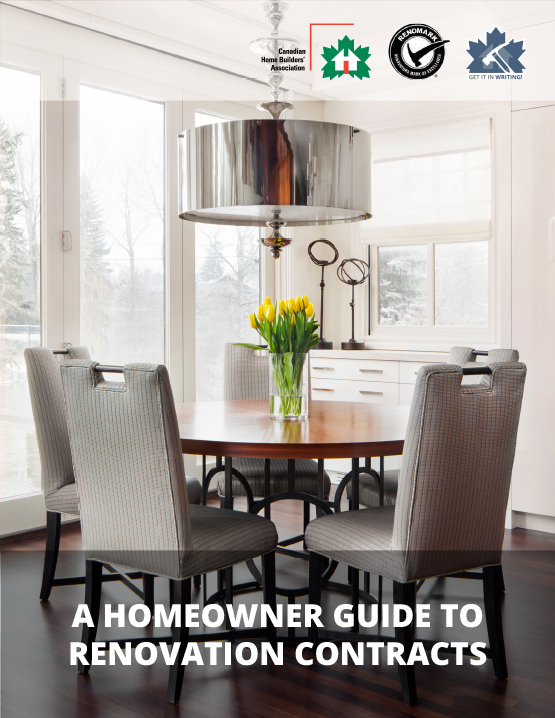Legal
Get it in Writing!
Get it in Writing! is a national consumer information program operated by the Canadian Home Builders’ Association in collaboration with the Government of Canada. It provides home owners with objective, how-to information on safely hiring a contractor to work on their home – with a proper written contract that protects them.
Get it in Writing! gives you comprehensive online information on the right way to hire a contractor, and avoid problems. Learn about:
- How to decide who has the right skills for your project
- What to ask contractors before you hire them – and what their answers should be
- What a price quote should tell you
- The type of warranty you should get
- Why any contractor must have insurance and Workers’ Compensation to protect you from risks
- How building permits and inspections keep it legal and safe for you
- And why a written contract is essential for your financial security
To learn more about the steps in a home renovation, click here.

Getting and reviewing price quotes
Price is a critical aspect of your renovation project. What will it cost to do the job you want? Alternatively, how far can you go on a set budget?
Determining the cost of a small project is usually fairly simple. Just make sure all the contractors bidding the job are providing the same services and materials.
For more complex projects, it often takes a few conversations with contractors to define the project to the point where they can begin determining costs.
For large project projects, it is often necessary to develop the complete design, specifications and plans first as an initial and separate job. Depending on the level of work involved, expect to pay a fee to have this done. Many renovators offer design and plans development services. If you have purchased such design services, you can use the completed material to ask contractors for a formal price quote. Having contractors price the job based on identical design and specification information will make evaluating their quotes much easier.
The level of detail required in plans will vary depending on the scope, size and complexity of the project. This can range from simple sketches or diagrams to full construction drawings for projects that involve altering the structure of your home.

Specifications are detailed descriptions of the specific materials and products you want to be used in your project. For instance, if you have decided on the brand and model of bathroom fixtures, these specifications should be included.
Alternatively, you may choose to work with a designer or architect and have them get price quotes from contractors.
"Guesstimates"
Experienced renovators can sometimes offer an educated opinion or price range on the spot, based on similar jobs they have done in the past - for instance, a per-square-foot estimate for additions or basement recreation rooms, or a rough cost estimate for upgrading your bathroom. This can be helpful upfront to make sure that there is a realistic fit between what you would like to do and the budget your have in mind. However, be aware that the cost of a project can vary greatly, depending on many factors, including the current condition of your home and the types of products you decide to use. A guesstimate is not a price quote.
Price quotes and bids
Price quotes and bids are the same – if written down they represent a renovator's offer to perform your renovation for a specified price, based on the description of the work included in their bid.
This document should specify the materials and products to be used (including brand names and model numbers), labour requirements for their crew and any necessary sub-trades, with accompanying costs for each item. Expect the price quote to include payment details such as payment timing and amounts, and what progress milestones each payment is associated with.
Up-front payments or deposits are usually required if you decide to accept a price quote and sign a contract, but deposits should not generally exceed 10% of the total cost of the work. The exception would be instances where the contractor had to purchase custom materials or products you have requested that are not returnable and must be pre-paid by him. Expect providing and additional deposit in this situation.
A written price quote is legally binding and becomes part of the contract between you and the renovator, should you accept it.
How many bids should you get? There are no hard and fast rules. On large projects, it is not uncommon for homeowners to interview several renovators, check their references and previous projects, and then choose one company to work with throughout the whole process, including developing plans and budgets as well as doing the actual work. In other cases, homeowners will go through a formal bidding process with a number of firms before deciding which contractor to hire.
Contracts
A contract is a legal agreement between you and the company you hire to do your renovation. It sets out the roles and responsibilities of both parties in relation to the project, and it protect both parties interests. Professional contractors and smart homeowners always work with a written contract that includes a detailed project plan and specifies exactly what you and your contractor have agreed to. A contract is the best way to protect yourself and to ensure things go as planned — in fact, it’s a valuable part of what a professional contractor provides.
What goes into a contract?
What kind of contract do you need? For a minor home repair, like replacing a kitchen faucet, a simple work order may be adequate. This would include the name and address of the company doing the work, your name and address, a brief description of the work being do, the cost and when payment is due. This don't need to be more than a page long.
For more substantial repairs, such as roof re-shingling, you’ll want additional detail on the materials to be used, such as brand and product specifications, and on the contractor's warranty.
For complex repairs and larger renovation projects, the contract can become fairly lengthy and will need to include full plans and specifications.
To help you navigate what should be included in a renovation contract, download "A Homeowner Guide to Renovation Contracts."
Developing a complete contract
What makes for a good contract? It provides full information on what is to be done, how and when it will be done, the cost and payments required, and the warranty provided. It clearly defines all aspects of the business relationship between you and your contractor in relation to the project.
A good contract treats both parties fairly. You get assurance that you’ll get what you agreed to, on the schedule agreed to, and at the price agreed to. The contractors gets their obligations clearly spelled out, and assurance that you will pay in full and on time.
Most often, once you and your contractor have reached agreement on what is to be done and want to proceed with the project, your contractor will prepare a standard draft contract for you to review. Review this document carefully to ensure it accurately reflects what you want and have agreed to.
If your project is high value or complex, you may want a lawyer to review the draft contract.
If you don’t agree with or understand aspects of the draft contract, or if details are missing, do not sign it. Discuss and resolve these issues with the contractor and have the contract amended as needed before you sign. Remember, once you and your contractor sign the contract, its terms are legally binding on both of you.
Essential Contract Information
Most contracts include two kinds of information. First, the contract defines what you and the contractor have agreed to. This includes basic information such as:
- who the contractor is
- what the contractor is responsible for doing, what work you will do yourself or have another contractor do
- if sub-contractor are to be used, who is responsible for hiring them, paying them and ensuring their work is done properly.
- who is responsible for obtaining necessary building permits and inspections
- when the work will be done (start and estimated completion dates)
- how much you will pay the contractor for the work
- when payments are to be made
- what warranty the contractor provides for the work
Second, the contract sets out basic business requirements the contractor must meet in order to protect in the event of an accident and to comply with the laws in your province. To do this, the contract should specify that your contractor:
- has adequate business liability insurance
- is enrolled in your province's Workers' Compensation program, or if exempt, has provided documentation proving this exemption
- agrees to payment holdbacks in accordance with your province's lien legislation
- has a Business or GST/HST Number
- is bonded if your province requires bonding
- has a license number if your municipality requires contractors to be licensed
The contractor should also warrant that any sub-contractor they engage to work on you project will also meet these business requirements.
Second, the contract sets out basic business requirements the contractor must meet in order to protect in the event of an accident and to comply with the laws in your province. To do this, the contract should specify that your contractor:
- has adequate business liability insurance
- is enrolled in your province's Workers' Compensation program, or if exempt, has provided documentation proving this exemption
- agrees to payment holdbacks in accordance with your province's lien legislation
- has a Business or GST/HST Number
- is bonded if your province requires bonding
- has a license number if your municipality requires contractors to be licensed
The contractor should also warrant that any sub-contractor they engage to work on you project will also meet these business requirements.

Finalizing Your Contract
The scope and complexity of the contract will vary according to the size of your project, but most contracts will contain the standard information outlined below. If you have any concerns or questions about the contract, discuss them with your professional renovator before you sign. You may also want to ask your lawyer to review it first.
Here are some of the points that should be covered in your contract:
Insurance and Workers' Compensation
Insurance
What happens if a contractor you hired accidentally damages your property, or the property of your neighbour? What if construction work on your property causes an injury?
In situations like these, the actions of your contractor could end up costing you money. That’s why you should work only with contractors who have adequate business insurance covering public liability and property damage. Ask for a Certificate of Insurance — proof that coverage is in place — as part of your contract.
You also need to consider your own Homeowners’ Insurance coverage when beginning a renovation project. In the event that your home is damaged, or damage is caused to a neighbouring property, your own insurance also needs to protect you.
Many people assume their homeowners’ insurance covers circumstances like these – and in many cases it does. But homeowners’ insurance policies vary widely in terms of coverage; some are comprehensive, but others cover only a certain number of "specified perils," and exclude everything else.
Before starting any work on your home, contact your home insurance broker or agent. Explain the work you plan to have done, who will be doing it, and ask if your present insurance policy provides adequate coverage. If it doesn’t, update your policy. You need adequate insurance even though your contractor is fully insured.
Workers’ Compensation
Workers' Compensation is a government program that provides workers injured on the job with financial support and, if required, pays for their rehabilitation. Workers' Compensation programs operate provincially, and enrolment is mandatory for most workers and employers. Homeowners usually don’t have to think about Workers' Compensation, which is the responsibility of the contractor they hire.
However, if your contractor is not complying with Workers' Compensation rules, you may face a financial risk - especially if you do not have a written contract that establishes that the contractor is an independent business, rather than being employed directly by you.

For example, in many provinces if a homeowner hires a contractor for cash "under the table" and the contractor is not enrolled in Workers' Compensation, the homeowner can be held financially responsible if a worker is hurt on their property.
How do you remove this risk? Ask your contractor for a Letter of Clearance from your province's Workers' Compensation program. If your province allows exemptions for self-employed workers, ask for a letter from the program stating that the contractor has been exempted.
If you hire a contractor who is not required to have Workers' Compensation coverage, find out if your own homeowners’ policy protects you against a personal injury lawsuit. If not, consider increasing your coverage.
For more information, it is always a good idea to contact your provincial Workers’ Compensation program.
Liens, Permits, and Warranties
Liens
A lien is a legal notice that someone is claiming the right to be paid from the value of your property. If your contractor does not pay suppliers or subcontractors for materials or work on your project, you could end up with a lien on your property title or deed. If that happens, you will probably be unable to renew your mortgage or sell your home until the lien holder has been paid and the lien removed.
Paying your contractor on time is no guarantee against a lien; if the contractor fails to pay subcontractors for materials or labour, a lien can be placed on your property.
How can you protect yourself? Lien laws are provincial, and vary across Canada, but all require that you hold back a portion of the total job cost (usually 10% to 15%) for 30 to 45 days after the work is completed. During this time, suppliers and/or subcontractors who did not get paid must register their liens with the courts. Your financial liability is limited to the amount of the holdback. Before you pay your contractor this final holdback payment, check with your land registry office to ensure that no liens have been registered against your property.
For more information, contact your provincial Consumers’ Affairs or Protection office and ask about applicable lien requirements where you live.
Building permits
Every province has building codes that are enforced by municipalities and utilities, such as electricity and natural gas providers. Before you start your project, it's important to understand how permits and inspections work.
Generally, a building permit is required for any work on your home that involves its load-bearing structure or that could affect the health and safety of occupants. Depending on the nature of your project, you may also need one or more of these permits:
- Electrical permit: For wiring in a new home or changes to the electrical system in an existing home.
- Plumbing permit: For plumbing in a new home or repairs or alterations to a home's existing plumbing.
- Gas permit: For new heating systems or other installations that use natural gas or propane, or for changes to these systems.Non-structural work, such as replacing shingles or flooring, often does not require a permit. Some work, like replacing windows, may or may not require one, depending on where you live and the exact nature of the work being done. If you’re not sure, call your municipal building permit office and describe your project. If a permit is required, you’ll likely be asked to bring drawings of your project to the municipal office.
Who’s Responsible for the Permit?
As the property owner, you are responsible for complying with all permit requirements for your project. When you and a contractor draw up your contract, you can specify that the contractor will obtain necessary permits and arrange for inspections on your behalf. If you don’t specify this in your contract, you are responsible for obtaining all necessary permits and inspections. If a project does not comply with building, electrical, plumbing or gas codes or municipal zoning requirements, your municipality or a utility can then force you to correct deficiencies in the work or demolish it.
What if a contractor suggests that you can "skip the permit" because no one will notice the work being done? Look for another contractor.
Warranties
Professional contractors provide a clearly-defined warranty on materials and workmanship, and set this out as part of the contract. Make sure this is included. Verbal assurances that a contractor will "come back and fix anything that goes wrong" are very difficult to enforce after the job is finished.
The contractor’s warranty should cover the quality of the installation or construction work done, specifying what is covered and for how long. Manufacturers of products used by the contractor warrant their products to be free from defects for a specified length of time if they were installed in accordance with the manufacturer's instructions. Your contractor should provide you with the manufacturers’ warranty documents on products and materials used in your project – make sure to get these.
The warranty provisions in your contract should also state how you can access warranty service from your contractor – contact details for any needed follow-up service.

